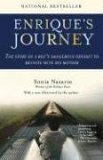Summary | Excerpt | Reading Guide | Reviews | Beyond the Book | Readalikes | Genres & Themes | Author Bio

The journey is hard for the Mexicans but harder still for Enrique and the others from Central America. They must make an illegal and dangerous trek up the length of Mexico. Counselors and immigration lawyers say only half of them get help from smugglers. The rest travel alone. They are cold,
hungry, and helpless. They are hunted like animals by corrupt police, bandits, and gang members deported from the United States. A University of Houston study found that most are robbed, beaten, or raped, usually several times. Some are killed.
They set out with little or no money. Thousands, shelter workers say, make their way through Mexico clinging to the sides and tops of freight trains. Since the 1990s, Mexico and the United States have tried to thwart them. To evade Mexican police and immigration authorities, the children jump onto and off of the moving train cars. Sometimes they fall, and the wheels tear them apart.
They navigate by word of mouth or by the arc of the sun. Often, they don't know where or when
they'll get their next meal. Some go days without eating. If a train stops even briefly, they crouch by the tracks, cup their hands, and steal sips of water from shiny puddles tainted with diesel fuel. At night, they huddle together on the train cars or next to the tracks. They sleep in trees, in tall grass, or in beds made of leaves.
Some are very young. Mexican rail workers have encountered seven-year-olds on their way to find their mothers. A
policeman discovered a nine-year-old boy near the downtown Los Angeles tracks.
"I'm looking for my mother," he said. The youngster had left Puerto Cortes in Honduras three months
before. He had been guided only by his cunning and the single thing he knew about her: where she lived. He had asked
everyone,
"How do I get to San Francisco?"
Typically, the children are teenagers. Some were babies when their mothers left; they know them only by pictures sent home. Others, a bit older, struggle to hold on to memories: One has slept in her
mother's bed; another has smelled her perfume, put on her deodorant, her clothes. One is old enough to remember his
mother's face, another her laugh, her favorite shade of lipstick, how her dress felt as she stood at the stove
patting tortillas.
Many, including Enrique, begin to idealize their mothers. They remember how their mothers fed and bathed them, how they walked them to kindergarten. In their absence, these
mothers become larger than life. Although in the United States the women struggle to pay rent and eat, in the imaginations of their children back home they become deliverance itself, the answer to every problem. Finding them becomes the quest for the Holy Grail.
CONFUSION
Enrique is bewildered. Who will take care of him now that his mother is gone? Lourdes, unable to burden her family with both of her children, has split them up. Belky stayed with
Lourdes's mother and sisters. For two years, Enrique is entrusted to his father, Luis, from whom his mother has been separated for three years.
Enrique clings to his daddy, who dotes on him. A bricklayer, his father takes Enrique to work and lets him help mix mortar. They live with
Enrique's grandmother. His father shares a bed with him and brings him apples and clothes. Every month,
Enrique misses his mother less, but he does not forget her.
"When is she coming for me?" he asks.
Lourdes and her smuggler cross Mexico on buses. Each afternoon, she closes her eyes. She imagines herself home at dusk, playing with Enrique under a eucalyptus tree in her
mother's front yard. Enrique straddles a broom, pretending it's a donkey, trotting around the muddy yard. Each afternoon, she presses her eyes shut and tears fall. Each afternoon, she reminds herself that if she is weak, if she does not keep moving forward, her children will pay.
Lourdes crosses into the United States in one of the largest immigrant waves in the
country's history. She enters at night through a rat-infested Tijuana sewage tunnel and makes her way to Los Angeles. There, in the downtown Greyhound bus terminal, the smuggler tells Lourdes to wait while he runs a quick errand.
He'll be right back. The smuggler has been paid to take her all the way to Miami.
Excerpted from Enrique's Journey by Sonia Nazario Copyright © 2006 by Sonia Nazario. Excerpted by permission of Random House, a division of Random House, Inc. All rights reserved. No part of this excerpt may be reproduced or reprinted without permission in writing from the publisher.
Your guide toexceptional books
BookBrowse seeks out and recommends the best in contemporary fiction and nonfiction—books that not only engage and entertain but also deepen our understanding of ourselves and the world around us.